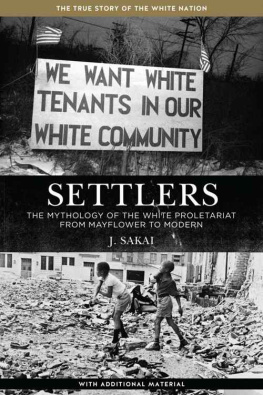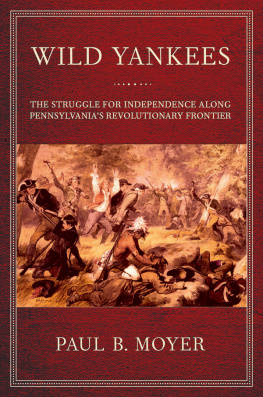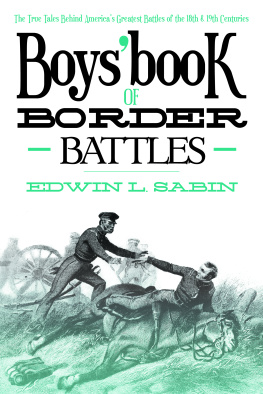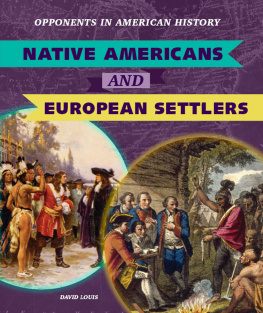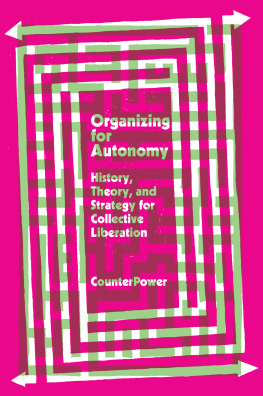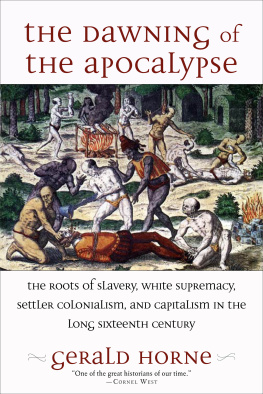Table of Contents
Settlers: The Mythology of the White Proletariat
from Mayflower to Modern
J. Sakai
Settlers: The Mythology of the White Proletariat from Mayflower
to Modern, by J. Sakai
Originally published under the title Mythology of the White Proletariat: A Short Course in Understanding Babylon in 1983, this 4th edition published in 2014 contains the original text (only lightly edited to standardize spellings, punctuation, etc.) as well as two appendices, Cash & Genocide (originally published in Crossroad in April 1989) and an interview with Ernesto Aguilar conducted on June 17, 2003, and originally aired on the Latino-culture program Sexto Sol on KPFT radio in Houston, Texas.
copyright J. Sakai, 2014
this first kindle edition copyright Kersplebedeb
ISBN: 978-1-894946-64-3
Kersplebedeb Publishing and Distribution
CP 63560
CCCP Van Horne
Montreal, Quebec
Canada H3W 3H8
www.kersplebedeb.com
www.leftwingbooks.net
Cover Design by John Yates
For those who made this book a reality
James Yaki Sayles
i had never had
an editor before. So it was with real shock and awe that i read his first
long kite to me, with over two hundred changes
and corrections that he wanted made.
David Saxner
When i took the Greyhound to
Chicago to see the book in final form,
DS was still cutting up type in long
strips and pasting it down alongside the pictures
he had found.
Day after day, in those pre-computer times,
DS had laid out the book into physical pages for
the printer.
His prison artist side and his
dedication to the struggle
were in the first printing of this work.
&
To all the comrads of Kamp 7
Authors Note
In the Fall 1961, i found myself with other militant Sit-In veterans in the reborn Oakland chapter of Congress of Racial Equality, picketing a major store which had refused to hire New Afrikans. Even in the Bay Area that was the custom and law back then. It had started years earlier for me in high school in L.A.s 1950s San Fernando Valley, where as the lone uneducated leftist i had tried unsuccessfully to sell copies of the socialist labor party newspaper (the only one i could get) every week to my classmates. At the same time was working as an Asian houseboy for the family of a Jewish used car dealer (stereotypes abound for a reason). Was fired for taking a night off for my own high school graduation. The wife lost it and screamed, People like you dont need graduations! A month later was living in a different state to find a job and avoid the colored military draft. And active as the novice food drive coordinator in a long, bitter, ugly hospital workers strike, whose main public demand was pay raises up to the federal minimum wage (we lost badly).
Have been through a thousand campaigns and movement groups since then, and cant believe ive been so dumb so often. In 1975, while mostly active doing Afrikan liberation movement support with radical exiles from various countries, i started writing a historical investigation into the puzzling class politics of euro-amerikan workers. Which i naively thought would only be a quick movement paper. Eight years later what became re-titled as Settlers was finished. Even then i didnt believe there was any audience for it, and planned to only photocopy fifty copies of my typed draft for internal education in the underground black liberation army coordinating committee. Comrades with more sense than myself insisted that we publish it as a book if only for the liberation movement. Over the years, we took it through three editions, but finally its time to hand it on to new publishers. Remember only, i wrote this with my life.
J. Sakai, 2014
The minority puts a dogmatic view in place of the critical, and an idealist one in place of the materialist. They regard mere discontent, instead of real conditions, as the driving wheel of revolution. Whereas we tell the workers: You have to go through 15, 20, 50 years of civil wars and national struggles, not only in order to change conditions but also to change yourselves and make yourselves capable of political rule; you, on the contrary, say: We must come to power immediately, or else we may as well go to sleep. Whilst we make a special point of directing the German workers attention to the undeveloped state of the German proletariat, you flatter the national feeling and the status-prejudice of the German artisans in the crudest possible way which, admittedly, is more popular. Just as the word people has been made holy by the democrats, so the word proletariat has been made holy by you.
Karl Marx, on the 1850 split in the German Communist League
Introduction
One day a friend introduced me to a young New Afrikan brother who was selling things on the sidewalk outside a large office building. When our talk turned to this book, the young brother looked up proudly and said: I already know everything about the White Man, and he knows nothing about me. As we were talking away I couldnt help thinking how many people had the same thought. Because they know that the white man is completely racist and treacherous, they wrongly assume that they know all about his society. This is really the point that this book begins from.
In fact, the 1960s breakthrough of ethnic studies programs at universities has been dialectically turned around and used against us. We are getting imperialist-sponsored and imperialist-financed Asian studies, Black studies, Puerto Rican studies, Indian studies, ethnic studies pushed back down our throats. Some of the most prominent Third World intellectuals in the U.S. Empire are getting paid good salaries by the imperialists to teach us our histories. Why?
U.S. imperialism would rather that all Third World people in their Empire remain totally blank and ignorant about themselves, their nations, their cultures, their pasts, about each other, about everything except going to work in the morning. But that day is over.
So instead they oppose enlightenment by giving in to it in form, but not in essence. Like ju-jitsu, our original demand that our separate and unique histories be uncovered and recognized is now being used to throw us off our ideological balance. The imperialists promote watered-down and distorted versions of our pasts as oppressed Third World nations and peoples.
The imperialists even concede that their standard U.S. history is a white history, and is supposedly incomplete unless the long-suppressed Third World histories are added to it. Why?
The key to the puzzle is that Theirstory (imperialist Euro-Amerikan mis-history) is not incomplete; it isnt true at all. Theirstory also includes the standard class analysis of Amerika that is put forward into our hands by the Euro-Amerikan Left. Theirstory keeps saying, over and over: You folks, just think about your own history; dont bother analyzing white society, just accept what we tell you about it.
In other words, its as if British liberals and socialists had told Afrikan anti-colonial revolutionaries in Ghana or Kenya to just study their own traditions but not to study the British Empire. Theirstory is not incomplete at all. Its a series of complete lies, an ideological worldview cleverly designed to further imperialist domination of the oppressed.
This work throws the light of historical materialism on Babylon itself. For so long the oppressed have been the objects of investigation by Euro-imperialist sociology, anthropology, psychology, etc. all to further pacifying and controlling us (anthropology, for example, had its origins as an intelligence service for European colonialization of the world). Now it is time to scientifically examine the oppressor society.
The final point we must make is that this document while it deals with aspects of our history within the U.S. Empire is nothing like a history of Asians here. Nor is it a history of Indian nations, the Afrikan Nation, Aztln, or other Third World nations or peoples. While we discuss Third World struggles and movements, this is not a critical examination of these political developments. This is a reconnaissance into enemy territory.
Next page
